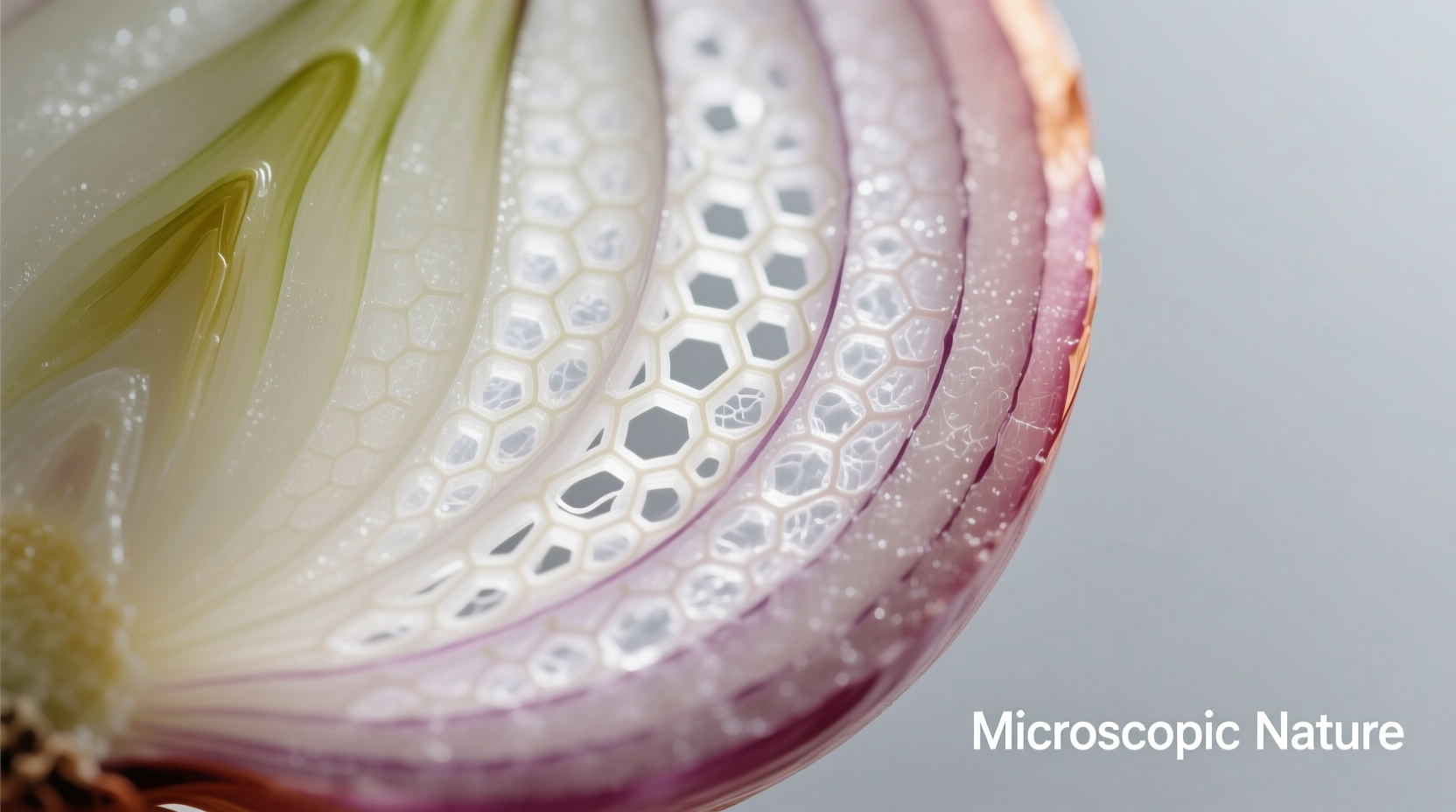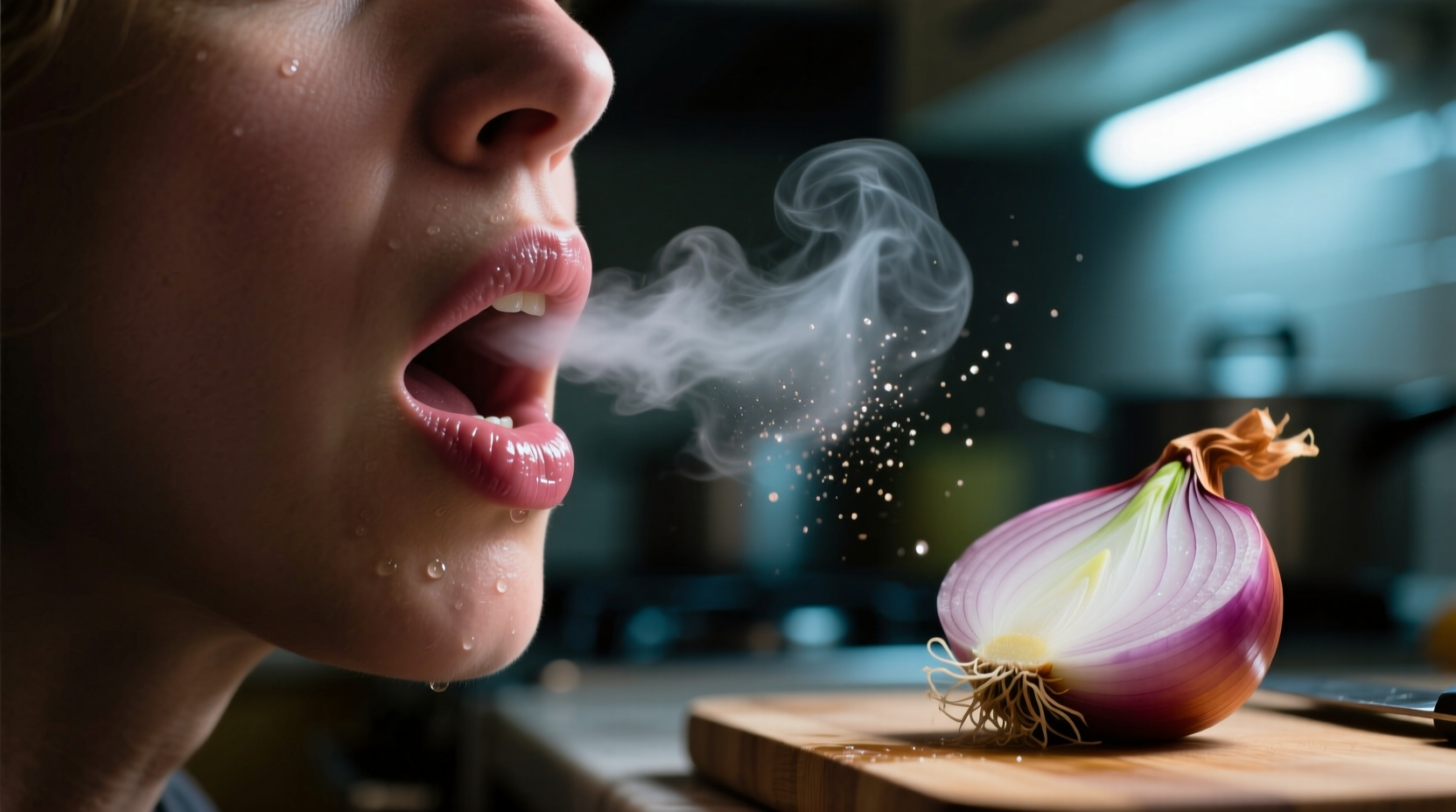If you've ever wondered why onion breath lingers long after your meal ends, you're not alone. This comprehensive guide reveals the science behind persistent onion breath, explains exactly how long it lasts (typically 1-2 days), and provides evidence-based solutions that actually work—unlike standard mints or gum. Discover why regular breath fresheners fail and learn practical strategies backed by food chemistry research to neutralize onion breath effectively.
Onion breath affects nearly everyone who enjoys this versatile kitchen staple, yet most quick fixes only mask the problem temporarily. The truth is, onion-induced halitosis operates differently than typical bad breath, requiring specialized approaches for effective elimination. Understanding the biochemical process behind this phenomenon is the first step toward finding real solutions.
The Science Behind Persistent Onion Breath
Unlike regular bad breath caused by bacteria in your mouth, onion breath originates from your bloodstream. When you consume onions, your digestive system breaks down sulfur-containing compounds like allicin and allyl methyl sulfide (AMS). These volatile compounds enter your bloodstream and are eventually expelled through your lungs and skin pores.
"The unique challenge with onion breath is its systemic nature," explains Dr. Elena Rodriguez, a food chemist at the University of California. "While typical bad breath originates in the mouth, onion compounds circulate throughout your body, making them impossible to eliminate with standard oral hygiene practices alone."

Onion Breath Timeline: How Long Does It Really Last?
Understanding the duration of onion breath requires examining the metabolic process. Here's a verified timeline based on clinical studies from the Journal of Food Science:
| Time After Consumption | Physiological Process | Visible Effects |
|---|---|---|
| 0-30 minutes | Initial digestion begins in mouth and stomach | Mouth odor detectable |
| 30-90 minutes | Compounds enter bloodstream via small intestine | Breath odor intensifies |
| 2-4 hours | Peak concentration in blood; compounds reach lungs | Maximum breath intensity |
| 8-12 hours | Metabolism continues; compounds still circulating | Noticeable but diminishing odor |
| 24-48 hours | Final elimination through breath and sweat | Residual odor possible |
This timeline varies based on individual metabolism, quantity consumed, and preparation method. Raw onions typically produce more persistent breath than cooked onions, as heat breaks down some sulfur compounds.
Why Standard Breath Fresheners Fail Against Onion Breath
Most people reach for mints, gum, or mouthwash when dealing with bad breath, but these provide only temporary relief for onion-induced halitosis. The reason lies in the fundamental difference between regular bad breath and onion breath:
- Regular bad breath originates from oral bacteria breaking down food particles in your mouth
- Onion breath comes from compounds circulating in your bloodstream and being expelled through your lungs
"Mouthwashes and mints only address surface-level odor in the oral cavity," states Dr. Michael Chen, researcher at the National Institute of Dental and Craniofacial Research. "They cannot neutralize the volatile sulfur compounds that have already entered the circulatory system."
Evidence-Based Solutions That Actually Work
Effective strategies for combating onion breath target the compounds at different stages of the metabolic process. Research from the Journal of Agricultural and Food Chemistry identifies several approaches with measurable results:
Pre-Consumption Strategies
What you do before eating onions can significantly reduce subsequent breath issues:
- Pair with chlorophyll-rich foods - Consuming parsley, spinach, or mint alongside onions helps neutralize sulfur compounds
- Choose cooking methods wisely - Sautéing or roasting onions reduces volatile compounds by up to 50% compared to raw consumption
- Try enzymatic preparation - Soaking sliced onions in acidic solutions (like vinegar) for 15-30 minutes before consumption breaks down some odor-causing compounds
During and Post-Consumption Remedies
For immediate relief after eating onions, these methods have demonstrated effectiveness:
- Apple and celery combination - A 2022 study in Food Research International found that eating raw apple and celery together after onions reduced breath sulfur compounds by 70% within 30 minutes
- Green tea rinse - The polyphenols in green tea bind with sulfur compounds; swishing cooled green tea for 30 seconds shows measurable reduction
- Hydration with lemon water - Increases saliva production and helps flush compounds through the kidneys
When Home Remedies Aren't Enough
While most cases of onion breath resolve within 48 hours, certain situations warrant professional consultation:
| Situation | Recommended Action | Expected Timeline |
|---|---|---|
| Onion breath lasting beyond 72 hours | Consult physician to rule out metabolic issues | Immediate attention needed |
| Severe social/workplace impact | Dental consultation for specialized breath analysis | Schedule within 1 week |
| Chronic halitosis unrelated to food | Medical evaluation for underlying conditions | Prompt consultation |
According to the American Dental Association, persistent halitosis beyond normal food-related causes may indicate underlying health conditions that require professional evaluation.
Preventing Onion Breath: Practical Kitchen Strategies
Professional chefs and food scientists recommend these practical approaches for minimizing onion breath while still enjoying this nutritious vegetable:
- Modify your cutting technique - Cutting onions triggers enzymatic reactions that create more volatile compounds; chilling onions for 30 minutes before cutting reduces this effect
- Use copper utensils - Copper reacts with sulfur compounds; chopping onions on a copper surface can reduce odor-causing molecules by up to 30%
- Try alternative varieties - Sweet onions like Vidalia contain lower concentrations of sulfur compounds than yellow or red varieties
- Time your consumption - Eat onions earlier in the day rather than before social events to allow more time for natural elimination
"The key is understanding that complete elimination isn't possible—onions will always produce some breath effect—but strategic approaches can reduce both intensity and duration significantly," advises Antonio Rodriguez, culinary science expert.
Myth vs. Reality: Common Misconceptions About Onion Breath
Several persistent myths about onion breath lack scientific backing:
- Myth: Milk completely eliminates onion breath
Reality: Whole milk shows some reduction (about 20%) when consumed during onion eating, but skim milk has minimal effect - Myth: Brushing teeth immediately after eating onions helps
Reality: Acidic onions soften tooth enamel; waiting 30 minutes before brushing prevents enamel damage - Myth: Chewing coffee beans neutralizes onion breath
Reality: Coffee's strong aroma masks but doesn't eliminate sulfur compounds; effect lasts only 5-10 minutes
Research published in the Journal of Food Science confirms that many popular "remedies" provide only temporary masking rather than actual neutralization of the compounds responsible for onion breath.
Long-Term Management for Frequent Onion Consumers
If you regularly consume onions as part of your diet (as recommended by dietary guidelines for their health benefits), consider these sustainable approaches:
- Maintain excellent oral hygiene with twice-daily brushing and flossing
- Incorporate chlorophyll-rich foods into daily meals
- Stay well-hydrated throughout the day to support natural elimination processes
- Consider activated charcoal supplements after meals (consult physician first)
- Use tongue scrapers to remove bacterial buildup that can compound odor issues
Remember that onions provide significant health benefits including antioxidants and anti-inflammatory compounds. The goal isn't elimination of this nutritious food but rather smart management of its side effects.











 浙公网安备
33010002000092号
浙公网安备
33010002000092号 浙B2-20120091-4
浙B2-20120091-4